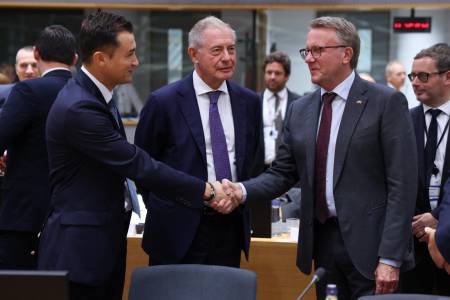Minister for the Economy, Enterprise and Strategic Projects, Silvio Schembri, today attended the Competitiveness Council in Brussels, where he underlined Malta’s strong commitment to enhancing Europe’s competitiveness, technological leadership, and digital transition.
In the morning, Minister Schembri joined Ministers from the 27 EU Member States in an event that formally endorsed the Semicon Declaration, which calls for a revised EU Chips Act to secure Europe’s global position in the semiconductor industry. He welcomed the declaration, noting that “investing in upskilling and reskilling our workforce is essential to keep Europe at the forefront of innovation.” Minister Schembri also highlighted Malta’s clear vision through the establishment of the Malta Semiconductor Competence Centre, which represents not just infrastructure, but a long-term investment in Malta’s role within the global semiconductor ecosystem, fully aligned with Malta Vision 2050.
During the Council discussions with fellow EU Ministers, Minister Schembri expressed Malta’s support for the European Competitiveness Fund (ECF), describing it as a step in the right direction to bridge Europe’s investment gap as outlined in the Draghi and Letta reports. Minister Schembri urged the European Commission and the EU Ministers to expedite discussions and procedures to ensure that actions are taken swiftly and that bureaucracy does not stand in the way of progress. He also spoke on the importance of simplification, geographical balance, and strong SME participation. Furthermore, Malta is advocating for dedicated funding streams for SMEs and Small Mid-Caps, fast and predictable processing of applications, and the use of digital tools to accelerate procedures. Minister Schembri underlined that the Fund must support not only traditional investment but also riskier, strategically vital projects—particularly in breakthrough technologies as well as providing funding for prefinancing.
On the Single Market Strategy, Malta reaffirmed its commitment to advancing digitalisation as a key enabler of competitiveness. Referring to the Malta Digitali Strategy 2022–2027, Minister Schembri emphasised the need for interoperable infrastructure, secure digital identity, and harmonised standards to reduce burdens and allow businesses to invest with confidence. He welcomed initiatives such as the Digital Product Passport, EU e-Invoicing, and the European Business Wallet, stressing the importance of implementing them in a proportional and SME-friendly manner.
“Europe’s future prosperity lies in innovation, digitalisation, and inclusivity. Malta is ready to work constructively with all Member States to ensure that Europe leads globally in competitiveness, resilience, and technological progress,” Minister Schembri concluded.
Earlier this month, Malta launched the Semiconductor Competence Centre, a national initiative that unites academia, research, and industry to foster innovation, develop skills, and create new opportunities for start-ups. This step positions Malta as an active contributor to the sector at the European level.
This builds on the largest foreign direct investment in Malta, the STMicroelectronics factory, and strengthens our role in this growing European sector. We are also deepening our collaboration with top research institutes such as IMEC in Belgium, so that Maltese students, researchers, and companies can benefit from access to advanced laboratories and high-quality opportunities.
Minister Schembri was accompanied by Permanent Secretary Godwin Mifsud, Deputy Permanent Representative Christopher Farrugia, and Head of Secretariat Roberta Albanese Dalli.
Photo: MEEP
![]()








